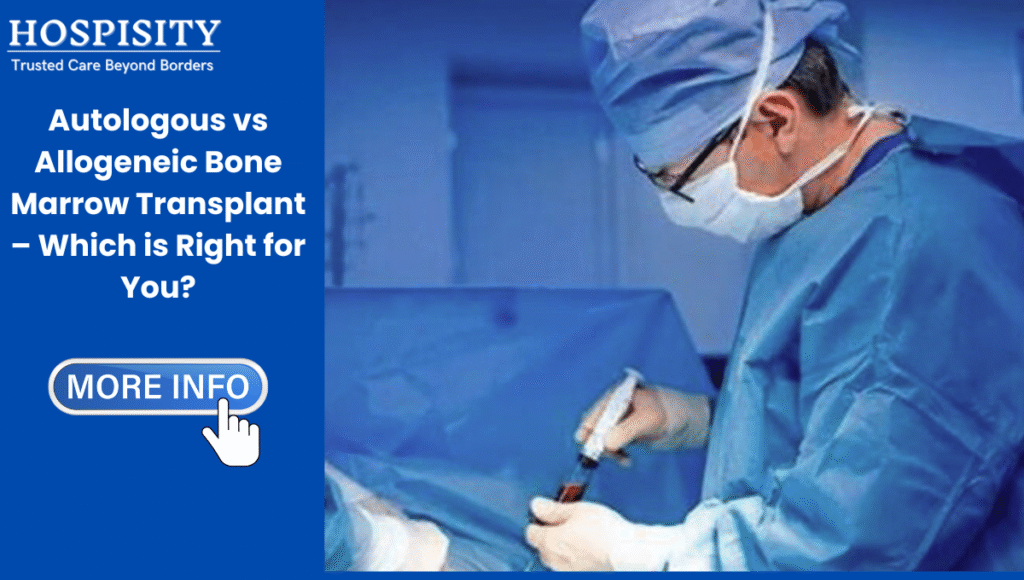Autologous vs Allogeneic Bone Marrow Transplant – Which is Right for You?

When diagnosed with a life-threatening blood disorder or cancer, a Bone Marrow Transplant (BMT) can be a transformative treatment option. But a critical part of your journey is deciding between autologous and allogeneic bone marrow transplant.
India has rapidly advanced in BMT capabilities, offering internationally accredited hospitals, cutting-edge transplant technology, and a pool of globally trained hematologist specialists. With HOSPISITY, international patients can access personalized treatment pathways and expert guidance at India’s top hospitals, all at an affordable cost.
What is a Bone Marrow Transplant?
A Bone Marrow Transplant (also called a stem cell transplant) replaces diseased or damaged bone marrow with healthy stem cells. This procedure is used to treat:
Leukaemia (AML, ALL, CML)
Lymphoma (Hodgkin and Non-Hodgkin)
Thalassemia Major & Sickle Cell Anaemia
Aplastic Anaemia
Inherited Bone Marrow Disorders
Two major types of BMT are performed in India:
Autologous Bone Marrow Transplant in India
Best For:
Hodgkin & Non-Hodgkin Lymphoma
Select cases of solid tumors
Procedure:
Patient’s own stem cells are harvested before high-dose chemotherapy and reinfused after treatment.
Advantages:
No risk of GVHD (Graft-versus-Host Disease)
Quicker immune recovery
No need for donor search
Limitations:
Less effective for genetic or inherited conditions
Higher relapse risk if cancer cells are not fully eradicated
Cost in India:
$14,000 – $18,000
Get a Personalized Cost Estimate for Autologous BMT
Allogeneic Bone Marrow Transplant in India
Best For:
Leukemia
Aplastic Anaemia
Thalassemia
Sickle Cell Disease
MDS and other genetic disorders
Procedure:
Stem cells are collected from a donor (sibling, unrelated, or haploidentical) and infused into the patient post-conditioning.
Types of Donors:
Matched Sibling Donor (MSD)
Matched Unrelated Donor (MUD)
Haploidentical Donor (half-match)
Advantages:
Potential for complete cure in genetic disorders
Offers a new immune system to fight residual disease
Risks:
GVHD risk
Need for prolonged immunosuppression
Cost in India:
$23,000 – $45,000, depending on donor type and complexity
Recovery Time & Medical Travel Info
Hospital Stay: 20–30 days
Total Stay in India: Up to 90 days including follow-up
Language Support: Available in Russian,Uzbek,Bangla, Pashto, Arabic, French, Swahili & more
Real Case Highlights
Case 1: Autologous BMT at Medanta Hospital
A 56-year-old patient from Nairobi underwent an autologous BMT for multiple myeloma. He was discharged in 21 days and resumed daily activities in 6 weeks.
Case 2: Allogeneic BMT for Thalassemia at Apollo Hospital, Delhi
An 8-year-old Iraqi child underwent a successful sibling donor BMT. Now transfusion-free, she attends school regularly.
Top Hospitals in India for Bone Marrow Transplant
FAQs-Autologous vs Allogeneic Bone Marrow Transplant
Q1: What’s the success rate of BMT in India?
Success rates range from 80% to 95%, depending on disease and transplant type.
Q2: Is BMT safe for children?
Yes, many centers in India offer specialized pediatric BMT programs with excellent outcomes.
Q3: What makes India a preferred destination for BMT?
Affordable cost, world-class infrastructure, and top bone marrow transplant specialists make India a top choice.
Q4: How soon can I travel for treatment?
With Hospisity’s fast-track visa and coordination, most patients begin treatment within 7–10 days.
